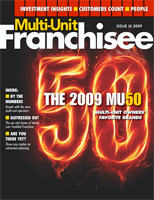Confronting the New Lending Reality: Adjustments Required As The Supply/Demand Equation Shifts
Why did lenders go from using fog-the-mirror underwriting to 100 percent cash collateral requirements in less than a 36-month period? Why did the banking watchdogs not bark?
From a franchise growth perspective, the answer is simple: It doesn't matter. What does matter is confronting the new lending reality.
Much tougher business loan underwriting standards have become the primary impediment to franchise growth. While it is helpful to understand why these standards have changed, it's not necessary. What is necessary is to understand the changes--and then change the approach taken to lenders so capital will continue to flow to franchising.
To understand the implications of not adjusting, hundreds of billions of banking capital dollars have been wiped out in the past year and a half. Since banking capital is leveraged about 10 times, this has eliminated trillions of dollars of lending capacity. With that much capital withdrawn from the market, the number of businesses crowding into banking lobbies seeking loans has increased dramatically. Franchise businesses are competing with all other types of businesses chasing a diminished supply of loan availability.
Lenders (that is to say, those institutions still in the lending game, predominately the smaller banks, credit unions, and leasing companies) are no longer competing for business loans as much as they are cherry picking which businesses to build a relationship with. Who can blame them? Certainly not me; I was part of the lending community when it was the other way around, and bankers were made to wait in business lobbies.
The supply/demand equation has shifted in favor of lenders. That we all know. What we need to pay attention to is what that will mean over the next few years as the economy tries to find a path toward vibrancy again, something that may take longer than many of us want to believe. Two challenges should be understood in this new reality.
First, when lenders extend credit they are often making 5- to 10-year bets. In a down economy, they clearly are changing their underwriting standards to reflect extended economic weakness. So with stress testing and lender aversion to risk, we are confronted with much tougher loan terms. But that's just the start.
When credit departments rule, as they do now, underwriting doesn't end with the borrower. In franchise lending, much more detailed analysis of the franchise brand is needed, something that for most of this decade was rather cursory at best. We last were in an underwriting period like this in the early to mid-1990s, when such indirect risks were part of the normal underwriting process. As we progressed into the 21st century, lending losses were minimal and such underwriting was relaxed, to put it kindly.
These indirect franchise lending risks can be grouped into two categories: 1) risk issues related to the franchisor, and 2) risk issues related to the franchise system. Franchisor risks include such things as management experience, financial strength, and franchisee support levels. Franchise system risks include such things as unit turnover and unit economics. While credit departments now require such analysis, the basic problem for franchise borrowers in that crowded lobby is, Who will do the work?
Until two years ago, franchise brands relied to a very large extent on preferred lenders. Preferred lenders were lenders that understood franchising and were willing to take the time to underwrite a brand because they expected to do lots of loans with that brand. Preferred lenders are an endangered species. There aren't many around, and those that are have reduced their lists of acceptable brands.
The active lenders today mostly are local financial institutions with limited franchise lending experience. Since they are local, they don't expect to do much lending with any one brand. So is it worth it for a local lender to do the indirect underwriting of a franchise brand for just one loan? The answer is: 1) probably not, and 2) why take the risk?
If the franchisor does not arrange to have this information assembled ahead of time in an objective, bank-oriented fashion, it often is easier for the local institution to serve number 22 in the lobby and pass on number 21. If the franchise brand has good performance (and why would you be considering them if they didn't?), you will stand out in that crowded banking lobby.
Assuming the first challenge is solved, a second challenge is very likely. Local financial institutions generally want the whole banking relationship with their business borrowers. There's a term for this that has been all but forgotten this decade and is back in vogue: Relationship Banking. In this economy--and especially for small to medium-sized multi-unit operators--the days of cobbling together loans from different lenders and banking services from other institutions are gone.
The good news is that multi-unit operators generally are considered a prize catch because of the number of their ancillary needs that generate fee income for banks. Just be prepared when your number is called to be asked for more, if not all, of your banking relationship needs.
Darrell Johnson is president and CEO of FRANdata, an independent research company supplying information and analysis for the franchising sector since 1989. He can be reached at 703-740-4700 or [email protected].
Share this Feature
Recommended Reading:
FRANCHISE TOPICS
- Multi-Unit Franchising
- Get Started in Franchising
- Franchise Growth
- Franchise Operations
- Open New Units
- Franchise Leadership
- Franchise Marketing
- Technology
- Franchise Law
- Franchise Awards
- Franchise Rankings
- Franchise Trends
- Franchise Development
- Featured Franchise Stories
FEATURED IN

Multi-Unit Franchisee Magazine: Issue 3, 2009

$120,000
$350,000





 The multi-unit franchise opportunities listed above are not related to or endorsed by Multi-Unit Franchisee or Franchise Update Media Group. We are not engaged in, supporting, or endorsing any specific franchise, business opportunity, company or individual. No statement in this site is to be construed as a recommendation. We encourage prospective franchise buyers to perform extensive due diligence when considering a franchise opportunity.
The multi-unit franchise opportunities listed above are not related to or endorsed by Multi-Unit Franchisee or Franchise Update Media Group. We are not engaged in, supporting, or endorsing any specific franchise, business opportunity, company or individual. No statement in this site is to be construed as a recommendation. We encourage prospective franchise buyers to perform extensive due diligence when considering a franchise opportunity.